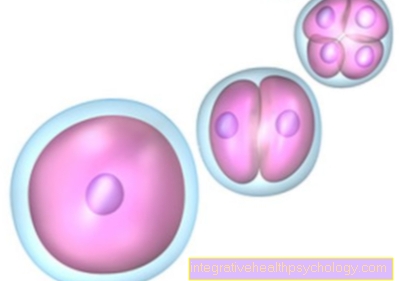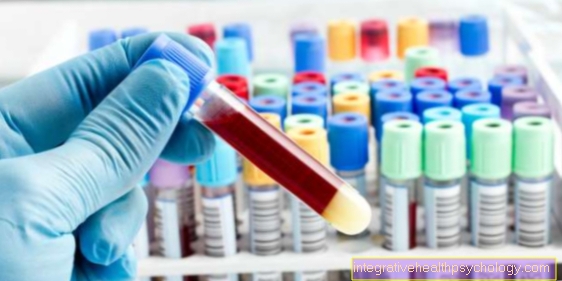interferon
Synonyms
IFN
introduction
The name interferon comes from the Latin word interferre and means something like to get involved. She is referring to the important role that interferons play in the body's immune system. Interferons are proteins, they consist of less than 200 amino acids. They are an important part of the humoral (non-cellular) body's own immune system and are made by various cells - especially white blood cells (leukocytes) but also tissue cells (Fibroblasts) - distributed and are used for regulation and communication. There are three major groups of interferons and three letters from the Greek alphabet are used:
Interferon alpha (IFN-α), interferon beta (IFN-β) and interferon gamma (IFN-γ). The interferons have an antiviral, antiproliferative and immunomodulatory effect in common, i.e. they work against viruses, inhibit cell growth, which plays an important role in tumor therapy, for example, and have a regulating effect on the immune system.
Trade names

(without claim of completeness)
- Interferon alpha
Roferon ®
Intron ®
Inferax®
Pegasys ®
PegIntron ® - Interferon beta
Avonex ®
Rebif ®
Betaferon ®
Fiblaferon ® - Interferon gamma
Polyferon ®
Imukin ®
Application / indication
Interferon alpha is used to treat some Tumor diseases, for example in hairy cell leukemia, chronic myeloid leukemia (CML), Kaposi's sarcoma, malignant melanoma, and some non-Hodgkin lymphomas (NHL).
Also for the treatment of myeloproliferative diseases (MPS) again Polycythemia vera and the Osteomyelofibrosis it is used because it inhibits cell growth and is able to normalize the excessively increased cell turnover in MPS. Furthermore, it is used to treat the chronic Hepatitis B. and acute and chronic Hepatitis C. used. The pegylated variant of Interferon alpha (Peg interferon) is on Polyethylene glycol bound and thus achieves a significantly longer half-life, so that it has to be administered less often (about 1x / week) than non-pegylated interferon alpha (about 3x / week).
Interferon beta is used to treat the multiple sclerosis (MS) used as Basic therapeutic as part of relapse prophylaxis, i.e. not to rapidly alleviate an acute relapse, but to reduce relapse frequency and intensity in the long term. The therapeutic effect only becomes apparent after several months.
Interferon gamma has so far found little use in clinical therapy.
Side effects
The side effects of interferon therapy are similar within the three groups. So it can too flu-like symptoms come with fever, chills, fatigue and aching limbs. All of them respond well to paracetamol. Furthermore, interferons work through their desired antiproliferative (Growth-inhibiting) effect also on the different rows of cells in the body and thus may cause a drop in blood platelets (thrombocytopenia) and white blood cells (leukocytopenia). A worsening of the liver function is also observed during interferon therapy, so that the liver enzymes should be checked regularly; a significant increase can be an indication of liver damage. Rarely, autoimmune disorders such as inflammation of the thyroid gland (thyroiditis) or inflammation of the liver (hepatitis) can occur. Side effects can also be felt in the central nervous system, for example in the form of depression, disorders of concentration and memory, and seizures.
Contraindication
Interferon therapy should be avoided in severe liver dysfunction - for example in the context of a Cirrhosis of the liver - with severe diseases of the heart, circulation, lungs and kidneys in some Autoimmune diseases and if the number is lower Platelets or white blood cells. With previous mental illnesses as well epilepsy Interferon therapy should be weighed very carefully due to the risk-benefit ratio. The same applies to therapy during a pregnancy and in the Lactation due to a lack of data to date.
dosage
Interferons are - depending on the preparation - subcutaneous (s.c. i.e. under the skin) or intramuscular (i.m. in the muscle) administered 1-3x / week. The dosages vary from product to product, so please refer to the relevant medical information.
costs
Due to the large number of interferon preparations, here are an example Interferon alpha Preparation (Roferon ®) and a Interferon beta Preparation (Avonex ®) listed. A Roferon ® pre-filled syringe with 3 million units (IU) costs - on a private prescription - about 40 eurosIf a prescription is available, the amount to be paid by the patient is reduced to 10 Euro. For Avonex ® in the form of a pre-filled syringe with 30 micrograms of active ingredient, costs amount to approximately 440 euros if there is a prescription, the portion to be borne by the patient is also reduced to 10 Euro.





























